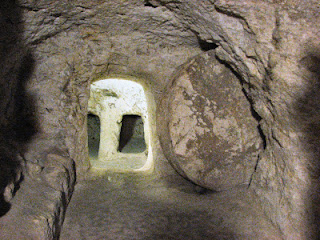"Jesus had to be God to Atone for Sin", Really?
This article/podcast focuses on #1 above, showing some of the dead-end inconsistencies and contradictions that the non-biblical speculation “Jesus had to be God to atone for sin” leads to. For comments about what the Bible does in fact declare, see “Jesus had to be a Mere Man, the Bible Tells Me So”.
What
deity of Christ folks are claiming with the “Jesus had to be God” claim is a kind
of penal substitution theory of atonement: somebody, or something else, a
substitute, had to pay the penalty for your and my sin.
And
that penalty is death. The claim is that instead of me, somebody else had to
die for my sin. My sin is worthy of death, so, unless someone pays the death
penalty, I will die. If someone else pays the penalty, then I don’t have to
die. My sin is worthy of death, so that’s why a death is required for justice. For
God to be just, someone had to pay the death penalty. But in place of me,
Jesus, who had to be God, paid that death penalty.
Again,
this is not a biblical claim. It is man’s philosophical speculation. And, the Bible says something
quite different.
But even
from a human or philosophical approach, I think most people, if we think about
it a little bit, can see the serious, non-biblical, theological, philosophical
dead ends, inconsistencies and contradictions with the deity of Christ claim.
Let’s
say I murder someone. The biblical penalty for murder is death. I deserve
death. I’ve been convicted in a court of law by jurors and a judge and
sentenced to death. But my friend, Mike, right as the judge is about to strike
the gavel down and send me off to execution, Mike stands up in the courtroom
and shouts “Wait! Stop!”. I’ll pay the
penalty for Bill. Kill me instead!”
So, the
judge says, “OK, the penalty for this crime is death. If you are willing to pay
the penalty, come on over here. Executioners, take the handcuffs off Bill and
put them on Mike. Mike, off to the electric chair. Bill, you are free to go!” And everyone in the courtroom nods their head
in agreement. “That’s fair. The penalty was paid. The judge kept the ancient laws
of justice.”
Nope.
People realize such a tactic is perversion of justice, not a maintenance of
justice.
For the
“Jesus must be God to pay for sin” folks there is another step in their
philosophical, non-biblical speculation. They start thinking: well, maybe
one person could give his life to pay the penalty for another (even though they
know that biblically – “the person who sins, he shall die”, Ezek. 18:20, even a
father can’t be penalized for the iniquity of his son). But our situation is
not just one person for one person. The deity of Christ philosopher speculates,
“Whoa, to pay the penalty for all sinners, for millions and billions of
sinners, Jesus would have to be eternal God to be enough to do that”.
So, their
speculation leads them to claim that God died; but again, in direct
contradiction to the Scriptures. In the Bible God is immortal and does not die.
“Well, not all of God died”, they claim. “Only one person of God died.”
So God
died but God did not die. Our philosophical speculation has led to this dead-end
contradiction.
“Well”,
they say, “death is only the separation of the soul from the body. One person
of God, or the soul/spirit of that one person, took on a human nature. So, the ‘God-spirit’
didn’t die, just the human nature.” This is a Platonic Greek view of death, not
the biblical view.
Some comments:
1.
A person-less human nature
(whatever that is) was enough to redeem all the multitude, millions, billion
from their sin?
The Trinitarian says that Jesus had to be God to atone for
mankind’s sin. But then the Trinitarian claims that God did not die, only
the human nature of Jesus died. So, the very thing the deity of Christ believer
claims was necessary for the forgiveness of sin, that God die, did not happen.
The deity of Christ believer claims that God had to die, but then turns
around and claims that God did not die - only a human nature.
But the Bible says we have been reconciled to God through
the death of his Son (Rom. 5: 10). Jesus said, “I was dead”
(Rev. 1:18). Not “my human nature died and came to life again”; but, “I
was dead”
2. However one defines death, even if one insists on the Platonic “death is the separation of the soul from the body”, the deity of Christ view requires that God die, that God went through the process of separation of soul from body. The Bible, on the other hand, insists that God is immortal and does not die.
3. Mainstream Christianity insists that the wages of sin is more than just death – it is eternal separation from God in eternal conscious torment. What man deserves for sin is eternal conscious torment. For Jesus to satisfy the justice of God or take your sin in place of you means Jesus must suffer eternal separation from God in a state of eternal conscious torment in hell.
The truth is, God said to Adam (Man) - with rebellion and disobedience, “You will die”. But mankind swallows the satanic lie and thinks, “No, I won’t die”. And even worse, we talk back to God and insist, “No God, you die”.
If your
philosophical, theological speculation brings you to the point where you
proclaim or insist that God died, rethink your belief.
Two biblical
verses to show that the Bible says something very different than “Jesus had to
be God to Atone for Sin”. The Bible says,
“Jesus had to be a ‘Mere’
Man”:
1
Corinthians 15:21. “For since death came through a man, the resurrection
of the dead also came through a man”.
1
Timothy 2:4-5 God "…desires all men to be saved and to come to a knowledge
of the truth. For there is one God, and there is one mediator between God and
men, a man Christ Jesus".
Resources:
https://www.youtube.com/watch?v=CtQXFuOXBaA
"Jesus
had to be God to atone for our sins." Really? Got a Scripture for that?
https://landandbible.blogspot.com/2019/01/jesus-had-to-be-god-to-atone-for-our.html
Book:
Atonement and Reconciliation:
https://www.amazon.com/Atonement-Reconciliation-contrasted-Substitutionary-Atonement/dp/B0CHDKFWCC



Comments
You wrote, "For Jesus to satisfy the justice of God or take your sin in place of you means Jesus must suffer eternal separation from God in a state of eternal conscious torment in hell."
I of course completely agree with your thesis that the Jesus-had-to-personally-be-God-in-order-to-make-an-atonement-for-sin position is not a biblical argument, but I am not sure you fully represented at least one nuanced version of the trinitarian analysis, and which I think is actually internally consistent within its own framework. This is the argument I was taught, and that I taught others, even from the pulpit (eeek!):
In his humanity, Jesus' suffering is finished and is, experientially speaking, behind him; but in his eternal deity as "God the Son," the experience of suffering the Father's wrath is an eternal conscious reality, since every moment is present tense to an everywhen eternal God who is himself outside time; as God, he can bear this without being overwhelmed of course; and, it is primarily through this never ending suffering that "God the Son" shows the profoundest love for us, in that he would take upon himself unending suffering for our sakes. On this basis we enjoy the hope of an unending atonement (even extending into eternity past!, thus justifying Micah 7:18-19 and similar promises of mercy to those who seek it) enabling an unending salvation for the people of God; no need for the man Christ Jesus to be forever personally experiencing those terrible three hours on the cross, or indeed any suffering beyond that.
Now, being an ex-trinitarian I of course no longer believe any of this tale of soteriological intrigue, but I thought it was worth pointing out so we do not level the lance at a straw knight.
I abandoned Incarnation and Trinity because God showed me that these are not scriptural concepts (except insofar as they are idolatry, and that is certainly a [proscribed] scriptural concept!). I did not in any way abandon the trinitarian error because of any internal contradiction I came to see in the above atonement formula.
I do currently think the scriptures teach a substitutionary sacrifice of atonement/propitiation and an (indirect) ransom, by the way. I simply see in the scriptures a trinity-free formula for this.
Thank you for all your edifying hard work in the word, in the pursuit of the truth.
Thanks for the comment. I must admit, I’ve had to read it over a few times to figure out just what the claim is. True, we don’t want to straw man anybody, but yikes, the nuances of the claim seem to be so subtle that I doubt that 1 out of a 100 Trinitarians could express that!
Like with the other “soteriological intrigue” (well said) it seems like such a claim leads to even more theo-philosophical inconsistencies and contradictions. In his eternal deity God the Son still is experiencing God’s wrath? Is that only the Father’s wrath, or is that also his own and the Spirit’s wrath? Why is the Father so nasty, why is he the only one who has to uphold “justice”. He certainly isn’t passing over and forgiving sin if he is making the Son eternally suffering (even though the Son can handle it, because his is God)…and on and on.
Something tells me it is only the ivory tower theologians who come up with this stuff and satisfy themselves. I don’t think the average Trinitarian Christian thinks the Son is eternally suffering. To the average Christian, the Son was “back” in Paradise the moment after that human nature breathed its last.
Blessings in Jesus of Nazareth, the Christ.
Dust Collector in Delhi
Centrifugal Blower in delhi
pulse jet bag filter India
Centrifugal Blower in Manufacturer
Dust Catcher Manufacturer
portable Dust collector manufacturer
Evaporative Cooler Manufacturer
structural-steel-tubes distributors in bhubaneshwar
Centralized Dust collector in dElhi
Checkered sheet dealer in gwalior